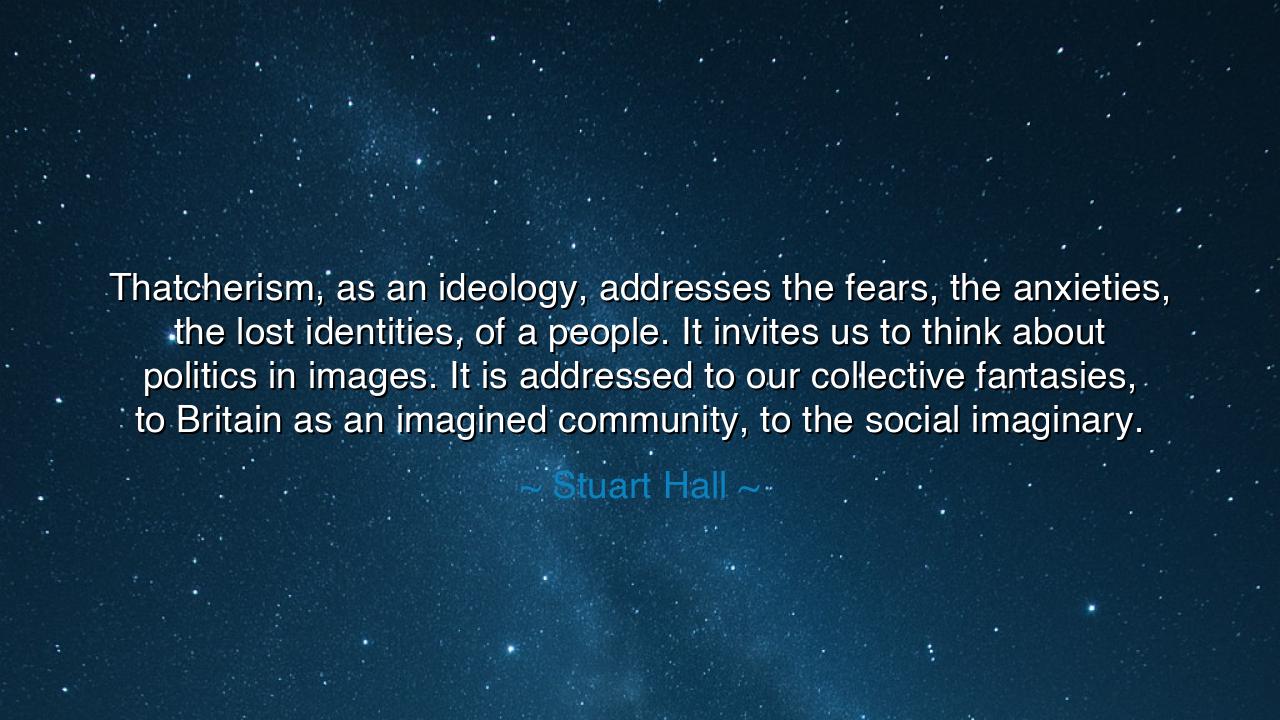
Thatcherism, as an ideology, addresses the fears, the anxieties
Thatcherism, as an ideology, addresses the fears, the anxieties, the lost identities, of a people. It invites us to think about politics in images. It is addressed to our collective fantasies, to Britain as an imagined community, to the social imaginary.






The words of Stuart Hall, “Thatcherism, as an ideology, addresses the fears, the anxieties, the lost identities, of a people. It invites us to think about politics in images. It is addressed to our collective fantasies, to Britain as an imagined community, to the social imaginary,” strike with the weight of prophecy. He reveals that politics is not built merely upon laws and policies, but upon the deep currents of myth, memory, and longing that stir in the hearts of the people. Leaders who triumph do so not only through reasoned arguments, but by weaving their vision into the collective imagination of the nation.
The ancients knew this power. In Rome, emperors raised monuments and told tales of divine destiny, binding citizens not only with armies but with images of Rome eternal. In Greece, the myth of shared ancestry bound scattered city-states under the idea of a single Hellenic identity. Stuart Hall unmasks Thatcherism as drawing from this same well: it spoke to Britain not in the language of policy alone, but in the imagery of renewal, nostalgia, and belonging, addressing wounds of fear and loss with the balm of story.
History provides countless parallels. Consider Franklin D. Roosevelt, who during the Great Depression did not merely present economic plans, but painted vivid images of hope—the New Deal, the forgotten man lifted, the nation united like an army against despair. It was not statistics alone that healed America, but the ability to enter the people’s imagination and give their pain new meaning. So too did Thatcherism, though in a different key, promise strength, order, and a reawakening of national pride to a Britain shaken by decline.
Hall’s words also serve as a warning. To rule the imaginary is to wield a power more potent than swords. For while policies can be debated, images slip past reason and root themselves in the soul. They shape what a people believe about themselves—whether they see decline or greatness, weakness or destiny. Thus, politics that dwells in the realm of fantasy can inspire renewal, but it can also blind a nation, making illusion seem like truth.
Let the generations remember: every people lives not only in houses of stone, but in houses of memory and dream. Leaders who understand this may awaken hope or manipulate fear. Thatcherism was such a force, harnessing the invisible tides of identity and anxiety, shaping Britain as an imagined community. To see politics clearly, one must learn not only to weigh policies, but to read the images and fantasies in which nations clothe themselves. For the battle of reality is often fought first in the realm of imagination.






AAdministratorAdministrator
Welcome, honored guests. Please leave a comment, we will respond soon